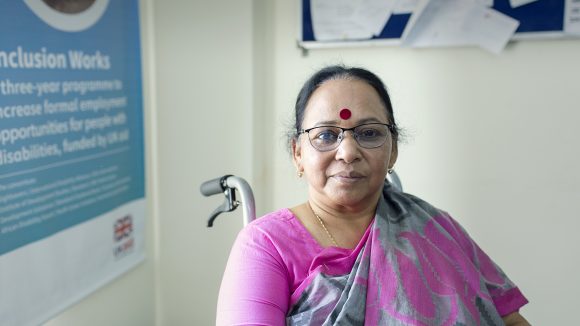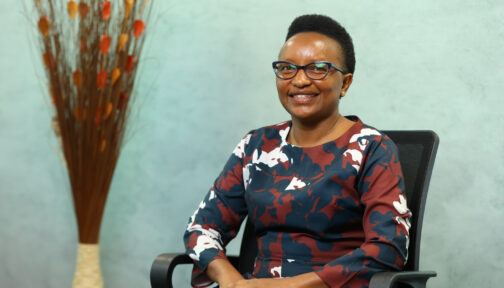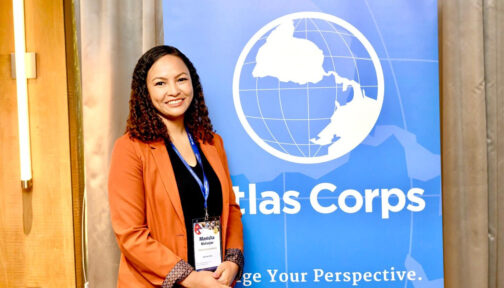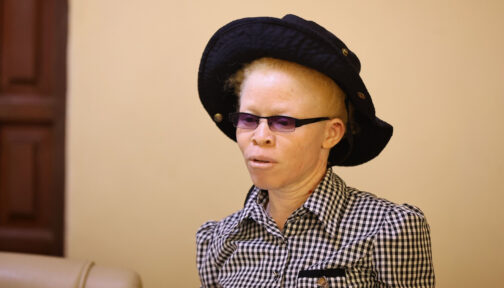Mohua Paul: “People are not talking with people with disabilities, others are talking”
Mohua Paul is co-founder of Access Bangladesh Foundation, an organisation of people with disabilities (OPD) organisation supporting the Inclusive Futures initiative.
Here, Mohua talks about her own experience of having a disability in Bangladesh and how she advocates for inclusion through ensuring people with disabilities have a voice.
Mohua’s story
“People are not talking with people with disabilities, others are talking. I’ve been paraplegic since I was 12 years old – my lower half is totally paralysed. Everywhere, there are barriers: people’s attitudes and negativity, mental health and within society.
“Throughout my 38 years’ working in the field of inclusion, the first thing I say to people asking how they can support people with disabilities is: “Talk to them. You will find a way and she’ll be your friend, he’ll be your friend, then you will understand. You have to make friendships. You have to change your attitude.”
“Society is not taking us seriously. If others say people with disabilities can’t do things, but they aren’t providing us with support, then it’s not fair. We can do things – we just need support.”
Societal barriers to inclusion
“In Bangladesh, people with disabilities cannot travel alone by road. We don’t have a single form of accessible transport that we can use to go to our jobs, schools or colleges. This is what we need. Severely disabled people, for example, with a spinal cord injury, need technology to help them to be mobile, but it’s not available in our country. I visited the UK and the trains and buses are accessible.
“So, I’m talking with our government ministers in Bangladesh, advocating for accessible buses. Because if the government does not think about equality as needs-based, inclusion will never happen. Employers need to give people with disabilities proper computers and chairs. The environment and attitudes are the most important things. People force you to do things, but you don’t get any support because they don’t know what you need.
“All of my life I have tried to counsel families of women with disabilities. Previously, I have worked with the council and government on how they can increase inclusivity between people with disabilities and without disabilities, particularly for women and girls, because females face more inequality than men for many reasons, including religious.
“Often, the person with disabilities and their family don’t believe that they can achieve things. I get emotional, because when I work with them, I always relate to them myself. Lots of faces of those that are facing problems in their family and community come to the front of my mind.”
Supporting women with disabilities
“In 2005, I was nominated for a Nobel Peace Prize. I don’t know who sent my name in, but it was for my contribution to the inclusion of women with disabilities in Bangladesh. At the time I was working with women and girls at the Centre for the Rehabilitation of the Paralysed. All the time I was thinking: “How can they be included within society?”
“There, I got to know someone who is blind and someone else who is tetraplegic, she can’t use her four limbs. I introduced them to each other, and they became friends. I said: “You could start a shop together!” They completed the training on talking with customers and handling money, and within three months they could run a shop together. I was surprised to see how this happened, but you cannot learn these things from a book – it is very practical.
“I’ve also received quite a few awards, for example my work has been recognised by the Joyeeta Foundation, a government foundation under the Ministry of Women and Children Affairs that provides financing and support to women entrepreneurs. The Ministry of Social Welfare has also recognised me as a successful person with disabilities.”
Increasing inclusion in education and employment
“Our main work is in employment and education. At Access Bangladesh Foundation, I spend some time in the office but a lot out in the community, visiting people and seeing what our staff are doing in our project work. Sometimes, I also have meetings in the ministry because we work nationally.
“In Savar, a sub-district of Dhaka, we are working with 65 deaf children and youth with disabilities to reduce societal barriers, build their capacity and empower them to claim their rights so they are included in their communities.
“In Dhamrai, another sub-district of Dhaka, we are working with 190 children with disabilities in mainstream education and supporting the economic empowerment of 110 youth with disabilities. We provide educational materials for their needs and cover the coaching fees for those who require it.
“We also provide support for young adults to get jobs in various places, such as government, garment factories and other factories; and we hold job fairs in coordination with different ministries.
“We identify persons with disabilities by going door-to-door. Through a survey, we identify exactly who is in the area where we are working. We record their education and what kind of jobs he or she wants to do. Then we work with other non-governmental organisations and the government to set up job opportunities for the person with disabilities.
“Before sending them to any job interview, we provide training on how to talk to the employers and what will be expected of them.
“Sometimes, we offer internships for people with disabilities for two or three months, after which they usually find it easier to get a job. We’re also working with employers to make sure that employees are comfortable, and the workplace is accessible. It can be very difficult for people using a wheelchair if there isn’t a ramp to the toilet. But the main barrier we face is their attitude. Some employers don’t want to think, they don’t want to listen; but now – the good news is, they are listening.”
Ending discrimination and exclusion
“But still, so many people are very alone in their homes. My wish is to see the person with disabilities independent and working. They will have their own family and they will support them. People won’t discriminate. People with and without disabilities will be equal.
“There will not be any barriers anywhere, be it at home or in the workplace. I believe this because of my own life – if people with disabilities are educated and if they’re working, they can earn money and have dignity in their family, in society and everywhere. There would be equal inclusion.”

Mohua Paul
Co-founder of Access Bangladesh Foundation, Bangladesh
Interested in partnering with OPDs in your work?
Find out moreMore from our people

Mellen Marucha: “Our starting point must be ensuring parents understand and embrace inclusive education”
Mellen Kemunto Marucha is the senior programme coordinator at Sense International in Kenya – an Inclusive Futures partner working with and for people with complex and multiple disabilities to ensure they have the right to live, learn and thrive in an inclusive society.

Manisha Maharjan: “Inclusion benefits everyone, not just those directly impacted”
Manisha is project manager for Humanity & Inclusion and leads our education project in Nepal, funded by UK aid under Inclusive Futures.

Lucy Odwar: “Women with disabilities face many challenges”
Lucy is a director in the department of gender, social services and disability inclusion in Homabay County government. Through her work as part of the Homabay County Disability Forum, she supports the Global Labor Program – Inclusive Futures.